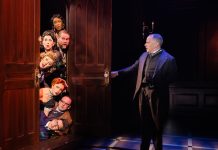Domestic felicity can make people blissfully idiotic and there is no greater a display of such jovial nonsense then in the Washington Stage Guild’s final production of their 25th Season, Wives and Wits – a Shavian evening featuring two one-act plays (by George Bernard Shaw) devoted to the notion of marriage and all its complications.

The first play, Overruled, features two married couples who are each having an affair with the other partner’s spouse; a witty comedy beyond compare with a circuitous method of accomplishing the trials and tribulations of proper etiquette in regards to lover’s trysts. The second play, Village Wooing, is essentially a love-at-first-sight story only one of the parties involved doesn’t know it. Mannerisms and memory are well-played in this delightful way to end the show.
Director Alan Wade of Overruled coaxes a fond level of jovial melodrama from his performers. The subject matter is a hilarious one but the actors take it very seriously and the more serious they become over the issue – the more hysterical it becomes to the audience. Wade’s precise coaching of the argumentative scenes glows with the boisterous nature of a lover’s quarrel turned dangerous and each of the player’s can still be heard and understood despite their shouting over one another. The pacing is rapid but not unintelligible and it allows this play to progress to its natural, comic ending without delay.
The scene opens on Mr. Lunn (Nick DePinto) wooing Mrs. Juno (Rana Kay) in a desperate attempt to profess his undying love to her. DePinto works wonders in this scene, truly gushing with infatuation while underhandedly utilizing the text to disguise his sexual urges, which are more than apparent in his body language. He proceeds to let his exasperation over learning that she is married rule the scene, driving each shift in his facial features and the panic that escalates in his voice. Kay begins this scene as an impetuous whining woman, her standoffish nature more obnoxious than should be tolerable. This plays well against DePinto’s constant attempts to physically align himself with her, and then her abrupt shrill squeaks of protest to counter his advances.
Their interactions are contained within a delicate bubble of deceit and melodramatic accusations, each shouted line of protest threatening to burst them apart as their words gurgle with sexual undertones in their witty plain text quips. Kay and DePinto are like simpering puppies whining over each other before jettisoning apart trying to adhere to their conscious sensibilities, building a series of justifications to their actions; each more absurd than the last.

Mr. Juno (Michael Glenn) and Mrs. Lunn (Dawn Thomas) have a similar relationship in the sense that one clearly wants deep involvement and the other is more reserved on the matter. Glenn takes a boldly romantic approach to his character, each line delivered with gusto and over-the-top dramatic shouting. His speech patterns display rolling pitch with bouncing tonality and wide expressive eyes to match each moment of professed emotions. By comparison Thomas’s indifference and boredom could outshine the sun. Her body is limber as she shifts from side to side, yawning and dismissing the advances sent her way. This is not to say her performance is boring, it is anything but as she again highlights the subtle sexual undertones of the text, building to a frantic climax and then plateauing into utter boredom. Thomas provides the complete opposite of Glenn’s hyper active performance; a perfect balance between the pair.
When the four combine the confusion hits peak levels to the point of even confusing the actors themselves. They no longer know who is married to whom and who is having what affair. What starts as petty accusations quickly devolves into vulgar fighting and degrading scenes; the men nearly coming to blows, the women laughing it off as if it were nothing. Glenn, Thomas, Kay, and DePinto create the epitome of a comic disaster; an uproarious train wreck ending in calamity, chaos, and sheer comic genius.
The second of the two shows, Village Wooing, directed by Laura Giannarelli, while still being a romantic comedy of sorts, had more subtly serious moments and did not move at such a spitfire pace. This balanced out the first act which blew by in a delightful whirlwind. Giannarelli worked with Rana Kay and Michael Glenn to create a series of character transformations in these two performers, letting their characters grow and change, truly becoming dynamic as the production unfurled.

Glenn starts off very secluded and easily irritated. His face flushes bright red as he explodes upon Kay in severe annoyance, wishing nothing more than to simply be left alone. Kay in return does her very best to drive him mad with her incessant chatter. While the dialogue is scripted the emotions and subtle shifts in vocal quality are raw and real. It feels like an actual conversation that might happen between a dreadfully annoying twit and a well educated introverted traveler. Kay shifts about in her lounge chair on the deck of the ship doing her very best to portray an odious gossip that crawls under Glenn’s skin. The pair bristle and barb against one another like angry porcupines; a volatile chemistry about to combust between them.
When times passes both Glenn and Kay make successful drastic shifts in their character while still carrying over various subtle traits that defined them to the audience in their first scene. Kay is still rather chatty but much more emotionally reserved; utilizing her girlish gestures and subtle gazes to express herself rather than relying solely upon words. Glenn is much more amiable toward her and has calmed his heated temper, settling into polite gestures and a more relaxed posture. This scene allows the pair to nettle at one another more subtly; intricate insults traded covertly through subtext rather than the blatant outbursts in the first scene. The dynamic shift between their two characters is refreshing and keeps the show engaging, allowing the verbose styling of Shaw to speak for itself.
So for a titillating romantic adventure that will pack your evening with scandal and touching sentiment, Washington Stage Guild’s Wives and Wits is the way to go.
Running Time: Two hours with one intermission.
Wives and Wits plays through May 20, 2012 at Washington Stage Guild, presented in The Undercroft Theatr – at the Mount Vernon Place United Methodist Church – 900 Massachusetts Avenue NW, in Washington DC. For tickets, call the box office at (240) 582-0050, or purchase them online.




